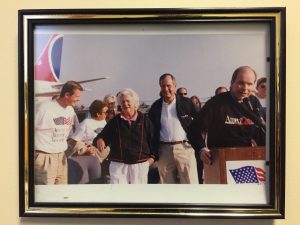I’m borrowing part of my “About Me” page to introduce here the concept of “economic engines”. It was a revelation to me at the dawning of the new millennium. Perhaps I was late to the party. When I looked up again 20 years later, I found many people talking about business as an economic engine.
You can find more pictures at https://colinvtjohnson.com/about-me/
In the meantime, here is the text of that page:
When I applied to business school in 1998, the application questions prompted me to reflect on my life and define what mattered to me. Through that process I realized that the prior decade of my father’s career was instructive in a way I had not realized as it was happening. My father went to work for AmeriCares ten years prior when I was a junior in high school in 1988.
As a idealistic youth, I had aspired to combat social inequality through my work, but I did not have the stomach for politics nor the patience for “pass the hat” philanthropy. When prompted by my business school applications to reflect upon my life, I saw in the origin story of AmeriCares an example of how business can serve as an economic engine to power any number of objectives. AmeriCares was not the engine. Rather it was AmeriCares’ founder Bob Macauley’s paper company, Virginia Fiber, that served as the economic engine that powered the good works at AmeriCares. Virginia Fiber contributed significantly to AmeriCares’ operating budget, and with this benefactor to fund its base operations, AmeriCares was able to become one of the preeminent humanitarian relief agencies in the world. AmeriCares’ prided itself on arriving first to tragic disasters anywhere in the world, providing critical first aid and life support until governments and NGOs fill in behind with longer-term services and reconstruction.

The example of AmeriCares, or specifically of Virginia Fiber, highlighted to me that learning to build businesses and then teaching that skill to underserved communities, would allow individuals in those communities to pull themselves up by their own bootstraps and achieve economic parity with better-served communities. With this realization, I focused my career on learning how to launch and run businesses the old-fashioned way, growing them from operating income rather than through venture investment. It was hard slogging, but those trenches taught me invaluable lessons on running, growing and selling businesses.

